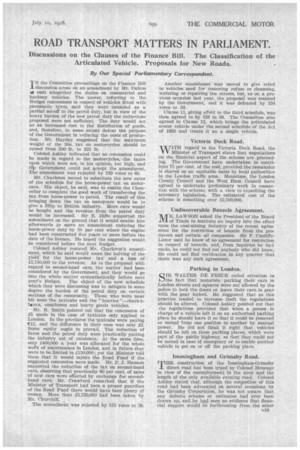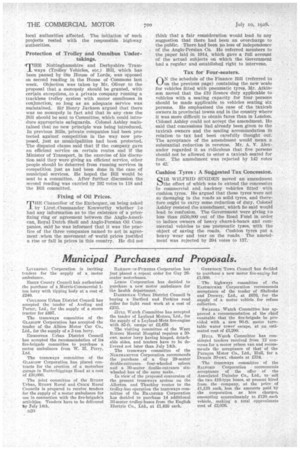ROAD TRANSPORT MATTERS IN PARLIAMENT.
Page 73

Page 74

If you've noticed an error in this article please click here to report it so we can fix it.
Discussions on the Clauses of the Finance Bill. The Classification of the Articulated Vehicle. Proposals for New Roads.
By Our Special Parliamentary Correspondent.
IN the Committee proceedings on the Finance Bill discussion arose on an amendment by Mr. Dalton -41 omit altogether the duties on commercial and hackney vehicles. The mover, referring to the Budget concessions in respect of vehicles fitted with pneumatic tyres, said they were intended as a partial set-off to the petrol duty, but in view of the heavy burden of the new petrol duty the reductions proposed were not sufficient. The duty would act as an increased cost in the distribution of goods, and, therefore, to some extent defeat the purpose of the Government in reducing the costs of produelion. Mr. Hayday suggested that the maximum weight of the 30s. tax on motorcycles should he raised from 200 lb. to 225 lb.
Colonel Ashley indicated that no concession could be made in regard to the motorcycles, the taxes upon which were not, in his opinion, too high, and tilie Government could not accept the amendment. The amendment was rejected by 139 votes to 60.
Mr. Charleton moved to substitute the new rates of the schedule for the horse-power tax on motorcars. His object, he said, was to enable the Chancellor to complete the good work of transferring the tax from horse-power to petrol. The result of this bringing down the tax on motorcars would be to give a fillip to British industry. More cars would be bought and the revenue from the petrol duty would be increased. Sir E. Iliffe supported the areendment on the ground that it would enable him afterwards to move an amendment reducing the horse-power duty by 50 per cent where the engine had been constructed five years or more before the date of the licence. He hoped the suggestion would be considered before the next Budget.
Colonel Ashley resisted Mr. Charleton's amendment, which he said would mean the halving of the yield for the horse-power tax and a loss of £5,750,000 to the revenue. As to the proposal with regard to second-hand cars, the matter had been considered by the Government, and they would go into the whole matter sympathetically before next year's Budget. The object of the new schedule which they were discussing was to mitigate in some degree the burden of the petrol duty on certain sections of the community. Those who were most ha were the taxicabs and the "heavies "—chars-Abe:tics, omnibuses and heavy goods vehicles.
Mr. B. Smith pointed out that the concession of 15 made in the case of taxicabs only applied to London. In the provinces the taxicabs were paying 112, and the difference in their ease was only £2. Some equity ought to prevail. The reduction of fares and the petrol duty were practically putting the industry out of existence. At the same time, only /400,000 a year was allocated for the whole work of maintenance in London, and in future they were to be limited to 1150,000; yet the Minister told them that it would injure the Road Fund if the suggested concession were made. Mr. P. J. Hannon supported the reduction of the tax on second-hand cars, observing that practically SO per cent. of sales of new cars were effected by exchange for secondhand cars.Mr. Crawfurd remarked that if the Minister of Transport had been a proper guardian of the Road Fund there would have been plenty of money. More than 15,750,000 had been taken by Mr. Churchill.
The amendment was rejected by 135 votes to 59. Another amendment was moved to give relief to vehicles used for removing refuse or cleansing, watering or repairing the streets, but, as on a previous .occasion last year, the proposal was resisted by the Government, and it was defeated by 134 votes to 59.
Clause 11, giving efferct to the third schedule, was then agreed to by 133 to 59. The .Committee also agreed to Clause 12, which brings the articulated motor vehicle under the second schedule of the Act of 1920 and treats it as a single vehicle.
Victoria Dock Road.
WITH regard to the Victoria Dock Road, the Minister of Transport states that negotiations on the financial aspect of the scheme are proceeding. The Government have undertaken to contribute 75 per cent, of the cost, provided the remainder is shared on an equitable -basis by local authorities in the London traffic area. Meantime, the London County Council and the West Ham Council have agreed to Undertake preliminary work in connection with the scheme, with a view to expediting the necessary legislation. The estimated cost of the scheme is something over 12,500,000.
Undiscoverable Benzole Agreement.
Airn. LAWSON asked the President of the Board ILL of Trade to institute an inquiry into the effect upon the coal-mining industry of the recent agreement for the restriction of benzoic from the producers and certain oil companies. Sir P. CunliffeLister said he knew of no agreement for restriction in respect of benzole, and, from inquiries he had made, he could not find out anybody who did know. He could not find verification in any quarter that there was any such agreement Parking in London.
SIR WALTER DE FRECE called attention to the fact that motorists parking their cars in London streets and squares were not allowed by the police to lock the doors or leave their cars in gear with the gear locked. He suggested that as this practice tended to increase theft the regulations should be altered. Colonel Ashley pointed out that the regulations provided that when a person in charge of a vehicle left it on an authorized parking place he should leave it so that it could be removed or moved from one position to another by manual power. He did not think it right that vehicles should be left on these parking places, which were part of the public highway, so that they could not be moved in case of emergency or to enable another vehicle to get on or off the parking place.
Immingham and Grimsby Road.
THE construction of the Immingham-Grimsby direct road has been urged by Colonel Heneage in view of the unemployment in the area and the length of the only available existing road. Colonel Ashley stated that, although the congestion of this road had been advocated on several occasions by the Grimsby Corporation, he was not aware that any definite scheme or estimates had ever been drawn up, and he had seen no evidence that financial support would be forthcoming from the other
local authorities affected. The initiation of such projects rested with the responsible highway authorities.
Protection of _Trolley and Omnibus Undertakings.Fibi Nottinghamshire and Derbyshire Tram
J. ways (Trolley Vehicles, etc.) Bill, which has been passed by the House of Lords, was opposed on second reading in the House of Commons last week. Objection was taken by Mr. Oliver to the proposal that a monopoly should be granted, with certain exceptions, to a private company running a trackless trolley system with motor omnibuses in conjunction, so long as an adequate service was maintained. Sir Henry Jackson argued that there was no monopoly in fact and that in any case the Bill Should be sent to Committee, which could introduce appropriate safeguards. Colonel Ashley maintained that no new principle was being introduced. In previous Bills, private companies had been protected against competition in the way now proposed, just as municipalities had been protected. The disputed clause said that if the company gave an efficient service on certain routes and if the Minister of Transport, in the exercise of his discretion said they were giving an efficient service, other people should be debarred from running services in competition just as had been done in the case of municipal services. He hoped the Bill would be sent to a committee. After further discussion the second reading was carried by 192 votes to 118 and the Bill committed.
Fixing of Oil Prices.
THE Chancellor of the EXchequer, on being asked by Lieut.-Commander Kenworthy whether 1.-.e had any information as to the existence of a prices fixing ring or agreement between the Anglo-American, Royal Dutch Shell and Anglo-Persian Oil Companies, said he Was informed that it was the practice of the three companies named to act in agreement when the movement of world prices justified a rise or fall in prices in this country. He did not
think that a fair consideration would lead to any suggestion that there had been an overcharge to the public. There had been no loss of independence of the Anglo-Persian CO. He referred members to the paper laid in 1914, which gave a full account of the actual subjects on which the Government had a regular and established right to intervene.
Tax for Four-seaters.
ON the schedule of the Finance Bill (referred to on the previous page) containing the new scale for vehicles fitted with pneumatic tyres, Mr. Atkinson moved that the f10 licence ,duty applicable to vehicles with a seating capacity for four persons should be made applicable to vehicles seating six persons. He emphasized the case of the taxicab owners in provincial towns and in the country where it was more difficult to obtain fares than in London. Colonel Ashley could not accept the amendment. He said that concessions had already been given to the taxicab owners and the seating accommodation in relation to tax had been carefully thought out. The acceptance of the amendment would mean a substantial reduction in revenue. Mr. A. V. Alexander regarded it Vis ridiculous that five persons should not be allowed to enter a taxicab seated for four. The amendment was rejected by 142 votes
to 42: •
Cushion Tyres : A Suggested Tax Concession.
OIR WILFRID SUGDEN moved an amendment the effect of which was to extend the concession "to commercial and hackney vehicles fitted with cushion tYres. He argued that these tyres were not So damaging to the roads as solid tyres, and therefore ought to carry some reduction of duty. Colonel Ashley resisted the amendment, which he said would lead. to Confusion. The Government were giving no less than 1650,000 out of the Road Fund in order to induce owners of heavy chars-k-bancs and commercial vehicles to use pneumatic types, with tile object of saving the roads. Cushion tyres put a heavy wear and tear on the roads. The amendment was rejected by 394 votes to 137.












































































































































































